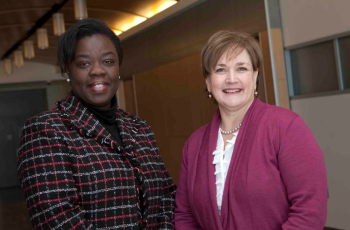|
|
In a recent survey conducted by Commonwealth Medicine’s Massachusetts Area Health Education Center (MassAHEC) Network, state primary care physicians emphasized the importance of a competent clinical support team for effective health care delivery. The MassAHEC Network is addressing this need and strengthening the health care workforce in Worcester’s most vulnerable communities by training mentors to support career development and job retention for entry-level medical assistants at community health centers.
As a member of the Central Massachusetts Community Health Center Partnership (CMCHCP), a collaborative established in March 2010 to focus on the needs of Worcester’s community health center workforce, the MassAHEC Network conducted a mentor and supervisor training program for registered nurses and experienced medical assistants last fall.
“The program trained these primary care professionals as mentors for medical assistants in community health centers,” said Mary Philbin, MEd, director of training and education for the MassAHEC Network. “Acquiring supervisory and mentoring skills enhances their own communication skills and enables them to support the career development of their entry-level peers. This serves to increase productivity in the community health care setting and improve patient care.”
Medical assistants are a critical part of the health care team, performing clinical and administrative functions, and are a vital component of primary care settings—particularly community health centers (CHCs), which serve at-risk and underserved populations. In Massachusetts, CHCs provide care to one in every nine residents.
Fifteen registered nurses and experienced medical assistants at the Family Health Center of Worcester participated in several face-to-face training sessions. Through instructive presentations and group discussions, participants learned about the difference between mentoring and supervision, as well as how to assess personalities and work styles; provide appropriate and useful feedback and solicit input; foster constructive team communication; develop effective techniques for motivating adult workers; and collaborate with a mentee to construct a goal-centered learning plan, among other skills.
According to Shelly Yarnie, MPH, MassAHEC Network associate director, trainee feedback was decidedly positive. “Participants said this was a valuable learning experience. Nursing supervisors are already seeing positive outcomes in the workplace and discussions about additional training needs and opportunities have begun.”
The Mentor and Supervisor Training Program is just one of four certificate programs provided by the CMCHCP to aid medical assistants with career development. Programs in medical interpreter training and patient navigator/community health worker training have been provided to medical assistants and staff at the Family Health Center of Worcester and the Edward M. Kennedy Health Center (formerly Great Brook Valley Health Center) by Central Massachusetts AHEC, which is part of the MassAHEC Network and a member of CMCHCP. Quinsigamond Community College, also a member of the partnership, offered enhanced clinical skills training and the Pre Health Program, which provide prerequisites for degrees in nursing, dental hygiene and other health care professional programs. CMCHCP is funded by the Commonwealth Corporation, an administrator of American Recovery and Reinvestment Act funds targeted at job creation and workforce training in Massachusetts.
In addition to the MassAHEC Network, CMCHCP includes the Central Massachusetts Workforce Investment Board, Family Health Center of Worcester, the Edward M. Kennedy Health Center, Quinsigamond Community College, Workforce Central Career Center, Central Massachusetts Area Health Education Center and the Grafton Job Corps Center.
|
In the January 2010 MassAHEC Network report, Recruitment and Retention of Primary Care Physicians at Community Health Centers: A Survey of Massachusetts Physicians, physicians recognized that their retention in a community health center “was in part dependent on a competent, inter-professional clinical support team skilled in primary care delivery.” The survey was conducted by the MassAHEC Network in collaboration with the Massachusetts Department of Public Health and the Massachusetts League of Community Health Centers, and with support from CWM’s Center for Health Policy and Research. |
About the Massachusetts Area Health Education Center Network
The Massachusetts Area Health Education Center (MassAHEC) Network is a statewide organization with six regional offices. Each office is hosted by a local nonprofit agency or the city health department with local advisory boards that provide guidance and input and ensure the office’s responsiveness to local health care workforce needs. MassAHEC Network addresses health disparities in the commonwealth by focusing on three areas of workforce development: fostering a culturally competent, skilled health care workforce; ensuring that all residents of the commonwealth have access to quality health care delivered by a skilled health care workforce; and ensuring that the diversity of the health care workforce reflects the diversity of the population it serves. The MassAHEC Network is part of Commonwealth Medicine’s Center for Health Policy and Research.
About Commonwealth Medicine
Commonwealth Medicine (CWM) is the public, nonprofit health care consulting and service organization founded by UMass Medical School. Government agencies, nonprofits and managed care organizations benefit from CWM’s expertise in clinical service delivery, health care financing strategies, policy management and quality improvement. CWM programs have helped Massachusetts—and many other state, international and local health care agencies—to increase the value of health care expenditures while improving access and delivery of care to at-risk and uninsured populations. Commonwealth Medicine programs were developed, in part, as a way for UMMS faculty and staff to have a direct and profound impact on the communities of Massachusetts, and now provide critical opportunities for UMMS faculty and students to serve the community.
